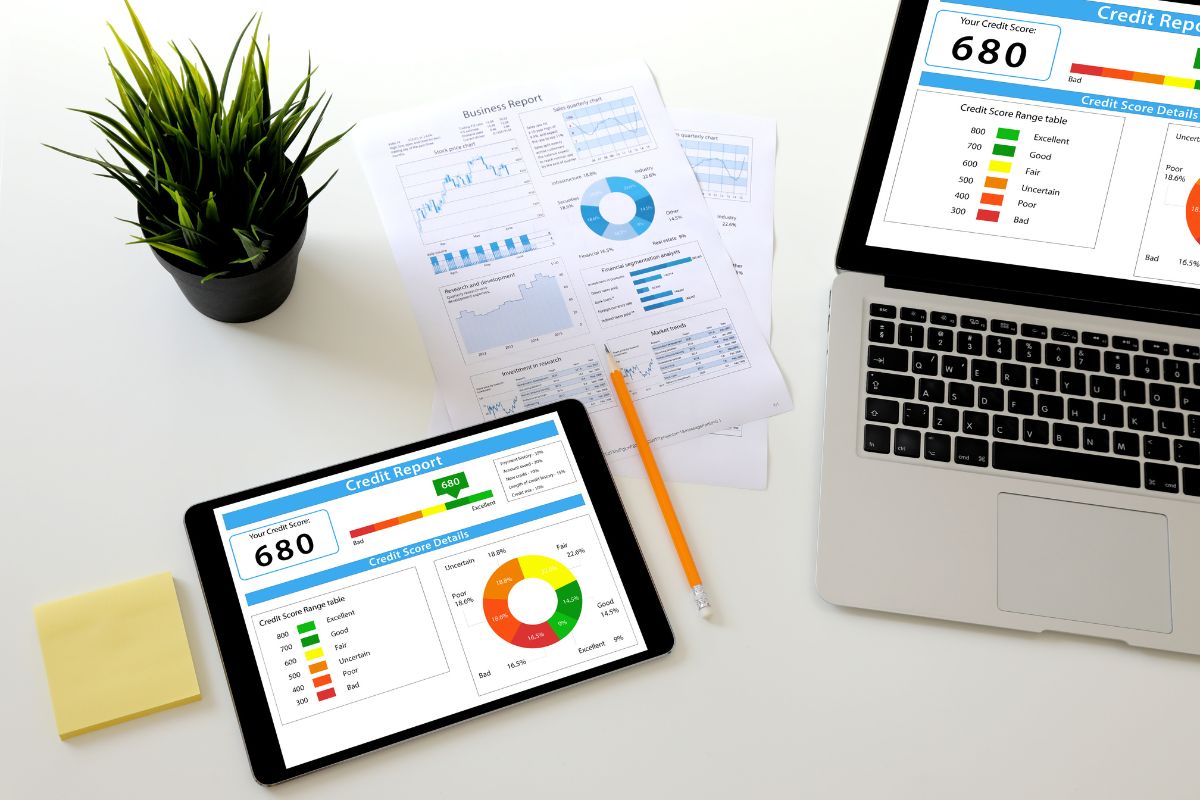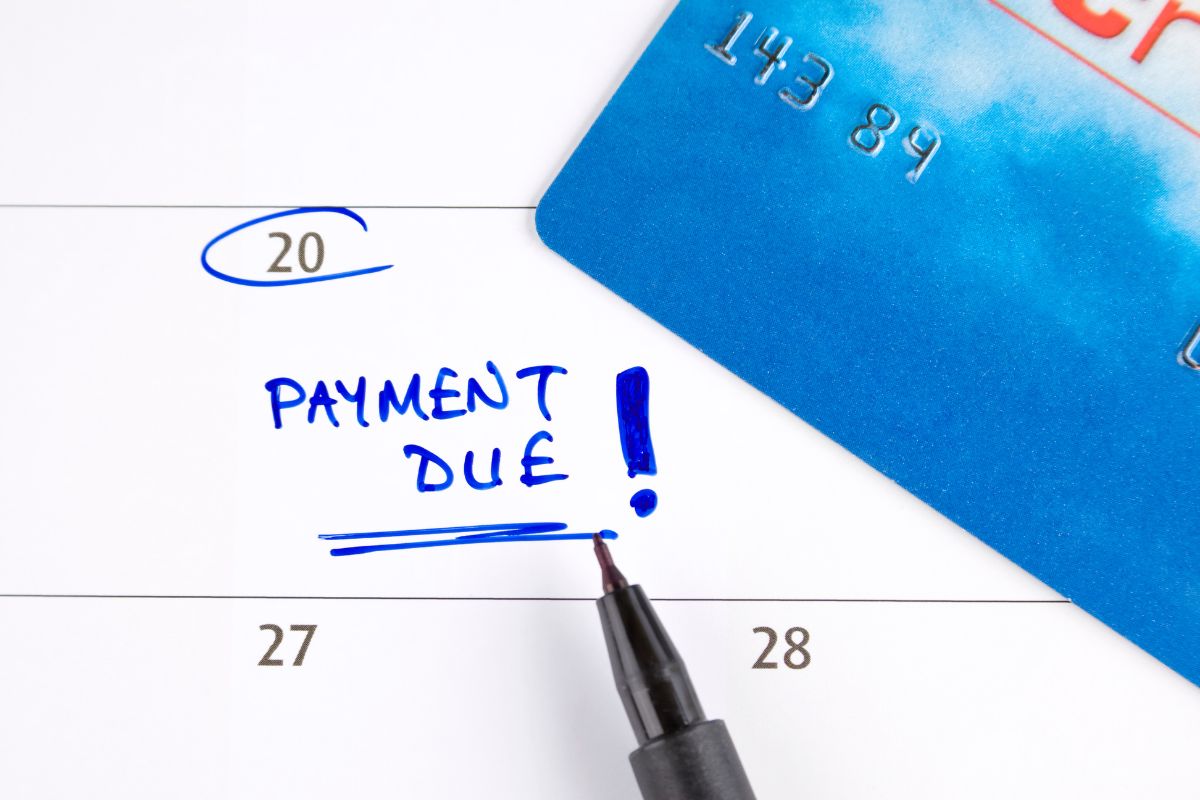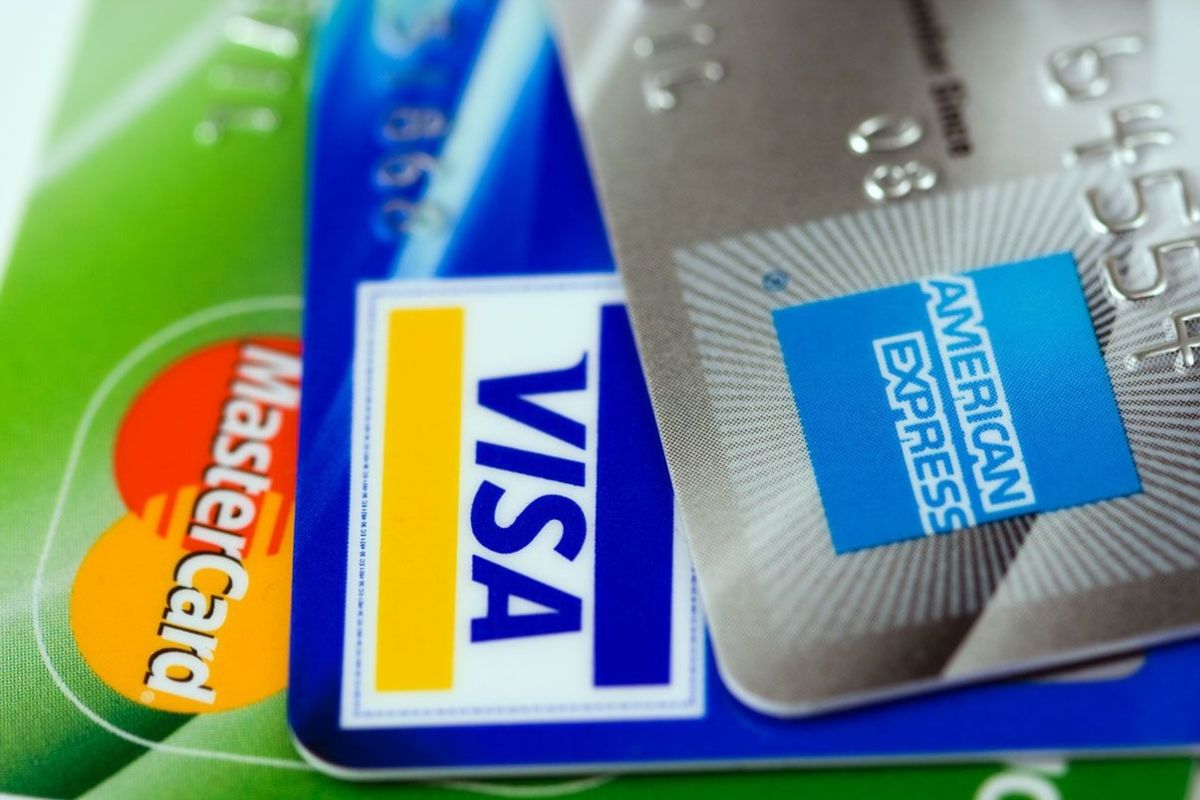Your credit score is key to your financial health. It affects everything from loan rates to credit card approvals. Improving it can open doors to better financial opportunities. But, how do you boost your score fast?
This guide offers practical steps to enhance your credit score. These include making timely payments, managing your debts, and fixing errors on your credit reports. While improving your score takes time, smart financial choices can speed up the process.
Key Takeaways
- Payment history accounts for 35% of your FICO® Score.
- Credit utilization rate is 30% of your FICO® Score.
- The length of your credit history contributes 15% of your FICO® Score.
- Credit mix influences 10% of your FICO® Score.
- Hard inquiries from credit applications constitute 10% of your FICO® Score.
- About 25% of Americans have errors on their credit reports.
- Disputing errors on your credit report can result in a quick credit score increase.
Understand Your Credit Report

Understanding your credit report is key to managing your finances well. It helps you see where you can improve and find any issues that might affect your credit score. By looking closely at your credit report, you can make smart choices to better your financial health.
Importance of Checking Your Credit Report
Checking your credit report often is vital for a strong financial health. It keeps you updated on your credit and helps you spot mistakes or fraud early. You can get free credit reports once a year from Equifax, Experian, and TransUnion at AnnualCreditReport.com. These reports give you a clear view of your credit history and let you monitor your credit closely.
How to Access Your Credit Reports
Getting your credit reports is easy. Just follow these steps:
- Go to AnnualCreditReport.com, the only place for free credit reports.
- Enter your Social Security number and birth date.
- Pick which credit bureau’s report you want – Equifax, Experian, or TransUnion.
- Answer some security questions to prove who you are.
- Save and review your credit report for later use.
These steps make it simple to get your credit reports. Then, you can check them carefully to make sure everything is right and complete.
Identifying Errors on Your Credit Report
Finding mistakes on your credit report is crucial for keeping your credit accurate. Mistakes can include wrong late payments, fake accounts, or wrong personal info. These errors can hurt your credit score and should be fixed quickly:
- Look over your credit report carefully.
- Mark any mistakes, like wrong late payments or accounts you didn’t open.
- Call the credit bureau to start a dispute. Equifax, Experian, and TransUnion have steps for fixing errors.
- Send proof to back up your claims.
- Keep an eye on your credit report to make sure the errors are fixed right.
| Error Type | Potential Impact on Credit Score | Correction Process |
|---|---|---|
| Incorrect late payments | Significant negative impact | Dispute with evidence of timely payments |
| Fraudulent accounts | Severe in case of identity theft | Dispute and provide identity proof |
| Inaccurate personal information | Potentially minor | Update information through the bureau |
By checking your credit report often and using free reports for monitoring, you can protect your finances. This helps you work towards a better credit score, making sure all your info is up-to-date and right.
Make On-Time Payments

It’s key to pay on time to keep a strong credit score. Payment history makes up about 35% of your FICO® Score. Paying bills on time boosts your credit and keeps you in good standing with lenders.
Setting Up Payment Reminders
Setting reminders helps avoid late payments. Many banks and credit card companies send reminders by text or email. These reminders help you pay on time, which is good for your credit score. They also make managing your accounts easier.
Using Autopay to Avoid Missed Payments
Autopay is great for keeping up with payments. It takes money from your bank account on the due date, so you won’t forget. This helps your credit score and gives you peace of mind. Experian Boost® also counts on-time payments for bills like utilities and subscriptions, which helps your credit report.
| Methods to Ensure On-Time Payments | Benefits to Credit Score |
|---|---|
| Setting Up Payment Reminders | Improves payment history by reducing missed payments |
| Using Autopay | Automates payment process, ensures timely payments |
| Utilizing Experian Boost® | Includes additional bills in your credit history |
Using these methods can greatly improve your payment history, a key part of your credit score. Paying bills on time makes you more creditworthy. This can lead to easier access to loans with better terms and higher credit limits.
Pay Down Revolving Account Balances
Lowering your revolving account balances, like credit cards and personal lines of credit, can boost your credit score. Your credit utilization rate makes up 30% of your FICO score. So, keeping your balances low is key. Here are some ways to pay down these balances and better your credit.
Strategies for Paying Off Debt
The debt snowball method is a good strategy. It involves paying off the smallest debts first while making minimum payments on the big ones. This approach gives you a feeling of achievement and keeps you motivated. Or, you could use the debt avalanche method, which targets debts with the highest interest rates to save money over time. Both methods can lower your credit utilization rate.
Think about using a balance transfer credit card too. These cards often have a 0% APR for a while on balances you transfer. This gives you time to pay off debt without extra interest. But, remember, balance transfer fees are usually 3% to 5% of the amount you transfer, so consider this in your plan.
Debt Consolidation Options
Debt consolidation loans combine several debts into one, often at a lower interest rate than credit cards. This makes your payments easier to manage and can lower your credit utilization rate. Paying off debt consolidation loans on time can improve your credit score.
For more help, consider debt management plans from credit counseling agencies. These plans merge your debts into one payment and may get lower interest rates for you. They might require you to close some credit accounts, but they offer a clear way to pay off debt.
Reducing revolving account balances and keeping them low is crucial for a better credit score. Using these debt repayment strategies and consolidation options can lead to a healthier financial situation. Keep an eye on your credit report and score to track your progress and adjust your plans as needed.
Don’t Close Your Oldest Account
Keeping your old credit accounts open is key to good credit health. Closing your oldest account can really hurt your credit score. This is because your credit history makes up about 15% of your FICO Score. It’s smart to keep these accounts active, even if you don’t use them much.
Your credit history length shows how long you’ve had your credit accounts. Closing an old account lowers this average age, which can drop your credit score. Plus, it reduces your total available credit, which can increase your credit use and hurt your score.
Let’s say you close a credit card with a $6,000 limit and a $1,500 balance. You’re left with another card having a $4,000 limit and the same $1,500 balance. This would raise your credit use from 30% to 75%, hurting your credit score. Experts say keeping your use below 30% is best for your score.
Also, how you managed an account can affect your credit report for up to 10 years after you close it. So, even if an account is closed, its history can still help or hurt your score for a long time.
If you have an old account with a yearly fee or high-interest rates, talk to your card issuer. They might drop the fees or lower the rates for customers who pay on time. Tools like CreditWise from Capital One can show you how closing an account will change your score. For example, closing your oldest account might only drop your score by one point from 808 to 807, which is a small effect.
So, keeping your old credit accounts open, even if you don’t use them much, helps keep your credit history long. This, along with low credit use and paying on time, keeps your credit strong over time.
Diversify the Types of Credit You Have

Having a mix of credit types is key to a strong credit profile. This mix, known as your credit mix, counts for about 10% of your FICO® Score. Handling different types of credit well shows lenders you can manage various debts.
Revolving credit includes things like credit cards and home equity lines. Installment credit covers loans for things like your home, car, or education. A good credit mix has both revolving and installment credit types.
It’s important to know which accounts affect your credit mix and which don’t. Payday loans and buy now, pay later loans don’t count. So, focusing on traditional accounts can help your score more.
Building a diverse credit mix is a long-term plan, not a quick fix. Avoid applying for too many credits as it can hurt your score. Adding yourself as an authorized user on someone’s credit card is another way to improve your mix safely.
Experian says a good credit profile has both revolving and installment credit. For example, having a credit card and a car loan shows you can manage different types of credit well. Cards like the Capital One Secured Credit Card and the Capital One Platinum Credit Card are good for those with fair to good credit.
| Credit Type | Examples | Impact on Score |
|---|---|---|
| Revolving Credit | Credit cards, Retail credit cards | Included in credit mix |
| Installment Credit | Mortgage loans, Auto loans | Included in credit mix |
| Non-Qualifying Loans | Payday loans, Auto title loans | Not factored in credit mix |
Limit New Credit Applications
Managing your new credit applications well can boost your financial health. It’s key to keep the number of hard inquiries low, especially when applying for different types of credit. This helps keep your credit score strong.
The Impact of Hard Inquiries on Your Score
Every time you apply for credit, a hard inquiry goes on your credit report. These inquiries can lower your score and stay there for two years. But, they only affect FICO® Scores for a year.
Even though inquiries don’t have a big effect, many applications in a short time can look risky. This is especially true if you don’t have much credit history. It’s smart to plan and only apply for credit when really needed to avoid looking financially unstable.
The Benefits of Prequalification
Prequalification is a great way to manage your credit inquiries. It lets you see if you’ll likely get credit without hurting your score, which is usually a soft inquiry. Soft inquiries don’t hurt your score like hard ones do.
Using prequalification can help you decide wisely and apply for credit confidently. It also keeps your credit rating strong by reducing hard inquiries on your report.
| Factor | Impact on Credit Score |
|---|---|
| Number of New Credit Accounts | Opening several accounts in a short period appears riskier. |
| Hard Inquiries from Applications | Are considered for 12 months and can lower your score. |
| Prequalification | Usually involves a soft inquiry, not affecting scores. |
| Rate Shopping | Multiple inquiries for certain types of credit within 14 days are considered as one inquiry. |
By limiting new credit applications and using prequalification, you can better manage your credit score. Knowing how hard inquiries and new credit affect your finances helps you make smarter choices in your credit journey.
Dispute Inaccurate Information on Your Credit Report

It’s crucial to tackle inaccuracies or fraud on your credit report. About 20% of credit reports have errors that can hurt your credit score. By disputing these issues with credit reporting companies, you can fix your credit report and improve your credit score.
Fraud hits around 9 million Americans every year, often causing credit report errors. If you find these errors, act fast. The Fair Credit Reporting Act lets you dispute these errors and requires bureaus to fix them for free.
When you dispute errors, companies like Equifax, Experian, and TransUnion must check and fix them within 30 days. About 71% of the time, consumers win, leading to wrong info being removed or corrected. This can greatly improve your credit score.
Here’s how you can reach the major credit reporting bureaus:
| Credit Bureau | Contact Methods | Additional Information |
|---|---|---|
| Equifax | Online, Mail, Phone (1-866-349-5191) | 6 free credit reports per year through 2026 |
| Experian | Online, Mail, Phone | Free weekly credit reports program extended |
| TransUnion | Online, Mail, Phone | Free weekly credit reports program extended |
To dispute errors, collect your documents and send them with your request. Only about 3% of disputes are seen as frivolous, showing most are taken seriously.
After fixing errors, companies tell all credit reporting agencies in about 85% of cases. You’ll get a free copy of your updated credit report, ensuring you see the changes.
Correcting your credit report can prevent issues like denied loans, insurance, or jobs. Fixing your credit now can lead to big benefits later, giving you a cleaner credit profile.
how to quickly improve credit score
To boost your credit score fast, you need to take a few key steps. First, try to lower your credit utilization ratio by paying off your debts. Lenders like to see this ratio at 30% or less. If you’re over 30%, paying down your debt can help improve your score.
It’s also important to fix any mistakes on your credit report. These errors can really hurt your score. By using rapid rescoring, which takes only three to five business days, you can quickly fix these problems. Always check your credit report often and correct any wrong info to help build credit.
Adding different types of credit to your mix is another smart move. This means having both revolving credit, like credit cards, and installment loans, like mortgages. This mix is seen as positive by credit scoring systems and can raise your score.
Try to avoid too many new credit inquiries. Each one can lower your score a bit. Only apply for new credit when you really need to. Using payment reminders or autopay can help you stay on top of bills, which is key for your credit score.
These steps won’t fix your credit overnight, but you should start seeing improvements in 30 to 45 days if you stick with them. Remember, building credit is a long-term process. Being consistent and responsible will pay off in the end, leading to a better credit score.
| Factor | Impact | Time to see results |
|---|---|---|
| Lowering credit utilization | Positive | 30-45 days |
| Fixing credit report errors | Positive | 3-5 days (with rapid rescoring) |
| Improving credit mix | Positive | Varies |
| Minimizing new credit inquiries | Positive | Immediate |
| On-time payments | Very Positive | Continuous |
Conclusion
Improving your credit score takes careful planning and sticking to good financial habits. Knowing how your FICO score works helps you focus on what matters most. Payment history, amounts owed, credit history length, credit types, and new credit all play a part.
Checking your credit report regularly and paying bills on time are key steps. Reducing your debt and having a mix of credit types also helps. Scores from 580-669 are considered fair, while 670-739 is good, and 800-850 is excellent.
Fixing mistakes on your credit report with agencies like Equifax, Experian, and TransUnion can boost your score. Since 90% of lenders look at FICO scores, managing these areas well can greatly improve your credit. Following these tips will help you get a strong credit score and open up more financial opportunities.










